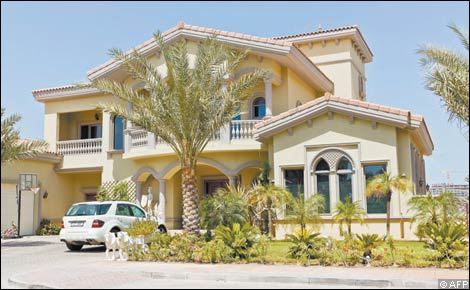The Financial Times, September 9, 2010
Afghan elite enjoys high life in Dubai
Dubai has become a magnet for Afghanistan’s smattering of nouveau riche: many invested heavily in the emirate’s seemingly never-ending real estate fairytale.
By Robin Wigglesworth in Dubai
In the ornate Shahista restaurant in Dubai, Afghans in traditional robes break the Ramadan fast with fare from their homeland, including “zaban” – or sheep’s tongue.

Money from Kabul Bank was used to invest in the Palm Jumeirah island development where Sherkhan Farnood, the bank’s former chief, has a villa. (Photo: AFP)
Yet the fleet of tinted and customised Mercedes parked outside the restaurant shows that the diners are not Afghan labourers who toil on the United Arab Emirates’ construction sites but scions of their country’s elite.
Shahista is owned by the Safi family, one of many wealthy clans who have fled Afghanistan for a safer and more business-friendly home in Dubai. The Safis also control Safi Airways, the country’s second-largest carrier after the state-owned Ariana Afghan Airlines.
Dubai has become a magnet for Afghanistan’s smattering of nouveau riche: many invested heavily in the emirate’s seemingly never-ending real estate fairytale.
However, the financial crisis abruptly ended Dubai’s property boom, and a scandal involving Kabul Bank, Afghanistan’s largest private lender, has highlighted the close but opaque ties between the Gulf’s commercial entrepot and the Afghan elite. The bank’s travails have also involved the blood relatives and political allies of President Hamid Karzai.
It recently emerged that Sherkhan Farnood, then chairman of Kabul Bank and a key supporter of Mr Karzai’s government, had used the bank’s money to invest in Dubai real estate, including villas on the Palm Jumeirah artificial island. This helped trigger panic among depositors and his ousting from the bank by the regulator.
Mahmoud Karzai, the Afghan president’s brother and the bank’s third largest shareholder, with a 7.4 per cent stake, lives in a beachside villa in Dubai.
“When the Taliban took over, anyone with money moved away, mostly to Dubai. It’s a very easy business environment. Afghanistan was dead business-wise. Some moved to Europe or the US, but most went here. It’s become a re-export centre for Afghanistan,” said Mr Karzai.
“People are uncertain about life in Afghanistan, so they bring money here. Corrupt people also bring money here, in case they are caught. Then there are legitimate business reasons for bringing money here.”
Mr Karzai, who bought his shareholding in the Kabul Bank through a loan from the same bank, says he was a “silent partner” in the enterprise. He will soon move out of the villa bought by Mr Farnood and rent another house nearby to avoid any impression of impropriety. He will lease the new villa for $5,000 a month from a “friend”, whom he declined to name.
Mr Karzai rejected suggestions that his family’s involvement in Kabul Bank had been improper. “This is completely untrue. Every issue is twisted to use against the Karzai family,” he said.
The owners of the Kabul Bank are not the only members of the Afghan elite to have been burnt by risky investments in Dubai. “Kabul Bank is the tip of the iceberg,” says one businessman who has lived in Kabul for almost a decade and is close to the Afghans in Dubai. “Afghans got very involved in the real estate market. They wanted to prove their wealth.”
A real estate agent who worked closely with Afghan émigrés says Nakheel, Dubai’s troubled, state-owned developer responsible for building the Palm Jumeirah, was a major recipient of Afghan investment.
Azizi Investments, owned by Mirwais Azizi, another prominent Dubai-based Afghan businessman, is involved in Nakheel’s Jebel Ali Palm island development, where progress has stalled because of the financial crisis.
The Azizi Hotak Trading Group also owns Azizi Bank in Afghanistan and is a big importer of refined petroleum products into the country. Mr Azizi could not be reached for comment.
Despite the emirate’s property crash, the Afghan business council estimates about $10bn flows between Dubai and Afghanistan every year. Analysts and Afghans say most of it leaves the country and some of it is derived from corruption and shady business deals. “The closest functioning banking system is here, so a lot of the money coming in could be legitimate but a lot of it is not. It’s drug money, graft money, extortion money,” says Theodore Karasik, a director of the Institute for Near East and Gulf Military Analysis (Inegma).
Some longer-established Afghan businessmen in the UAE, such as the Safis and Azizis, are reviving their business interests in their home country. But corruption in Afghanistan and the travails of the Kabul Bank could sour their appetite for further investments and send even more money out of the country, analysts say.
“The second they set foot in Kabul, they get embroiled in Afghan politics. A lot have got fingers in Afghan businesses but are getting fed up by the graft . . . It’s not even baksheesh any more, it’s intimidation,” said a businessman.
Characters Count: 5912
